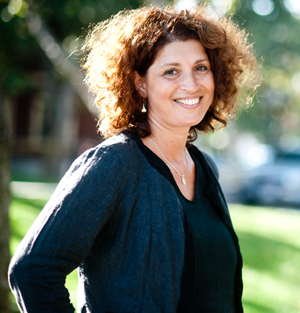
Andrea Szönyi
Andrea Szönyi is well aware of the challenges she faces introducing testimony to educators and students in Hungary, but she’s determined to overcome them.
Szönyi is USC Shoah Foundation’s senior international training consultant and regional consultant in Hungary. She worked for years as a high school teacher and is currently the director of Zachor Foundation for Social Remembrance, a nonprofit educational institution working in holocaust and human rights education in Hungary. She is the author of several educational materials and the editor of publications and has also published several translations, and is a Holocaust Education Fellow of the Imperial War Museum in London.
Szönyi had been familiar with the Shoah Foundation ever since it began interviewing Holocaust survivors in Hungary around 1999 – including her father, György Kun. After meeting Karen Jungblut, USC Shoah Foundation director of research, at a conference, Szönyi was hired as its regional consultant in Hungary in 2008.
As the Institute’s Hungarian regional consultant and international training consultant, Szönyi is responsible for organizing educational outreach, teacher trainings and seminars, partnerships with schools and universities, and the production of educational products and programs in Hungary.
Szönyi said there are countless rewarding moments in her work, especially when she gets to witness teachers, students, and even survivors interacting with testimony from the Visual History Archive and being profoundly affected.
“When I see survivors feeling impressed by the way we use their testimony – it is a reward. When teachers engage in a fruitful discussion – it is a reward. When students are able to make the connections between past and present – it is a reward. And I could go on,” Szönyi said.
But working in Hungary can be difficult, she said. Breaking down stereotypes and getting teachers interested in working with testimony – instead of dismissing it as just “one more Holocaust project” – are challenges she often faces.
“But challenges are there not to face them but to overcome them,” Szönyi said.
Hungary has a troubled history, especially in the 20th century, Szönyi said, and she and her international colleagues strive to educate young people to be open-minded and to think critically, analyze and evaluate things.
“We want them to know that history is not some abstract thing in the past, that history is not just ‘happening.’ It happens to people, and people make it happen. Everyday people like themselves,” Szönyi said. “The testimonies and the various educational materials we bring to teachers and students help them understand this and make them think. And this is important to the country, to the Institute and to me too.”